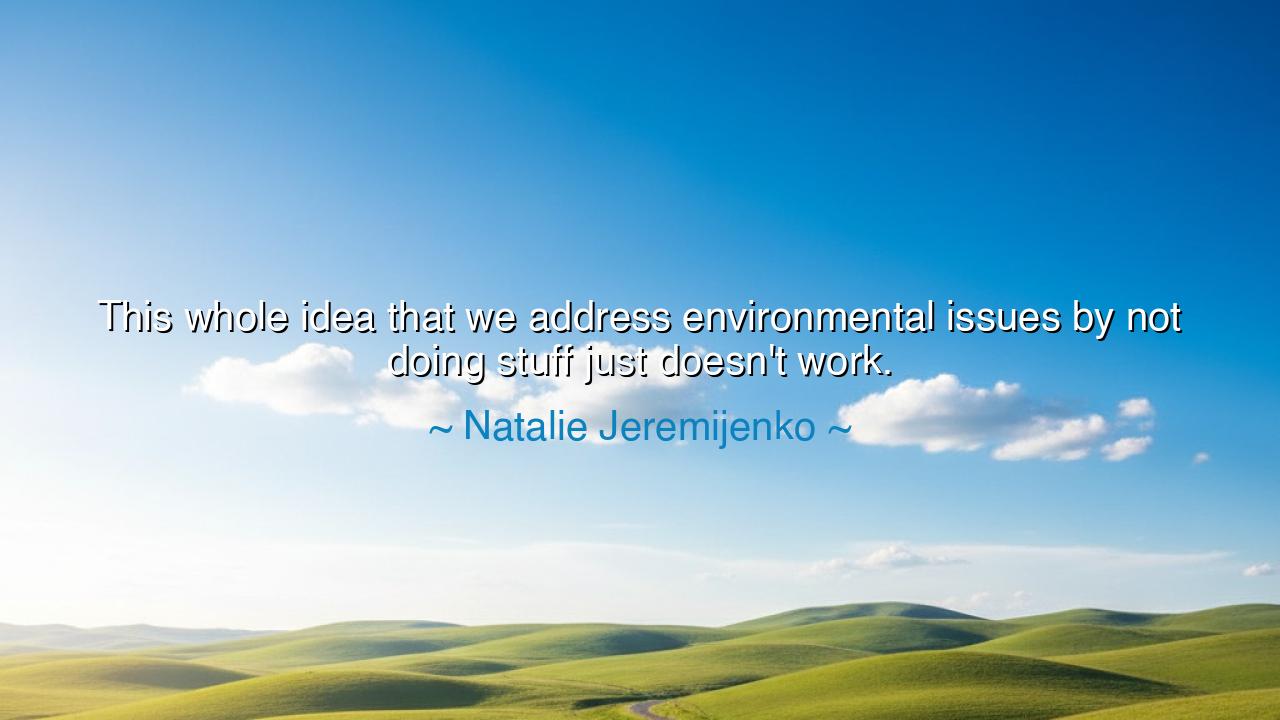
This whole idea that we address environmental issues by not doing
This whole idea that we address environmental issues by not doing stuff just doesn't work.






Hear, O children of the earth, the bold words of Natalie Jeremijenko, artist, engineer, and visionary: “This whole idea that we address environmental issues by not doing stuff just doesn’t work.” At first, the phrase may sound defiant, even playful. Yet beneath its tone lies a mighty truth: that salvation will not come through silence or abstinence alone, but through bold acts of creation. Jeremijenko rejects the false comfort of inaction, reminding us that the healing of the planet requires invention, imagination, and the courage to build anew.
The meaning of this teaching lies in the contrast between negation and creation. Too often, when confronted with the enormity of environmental destruction, people are told that the solution is to simply stop: stop consuming, stop producing, stop moving, stop growing. But Jeremijenko declares that this is insufficient. To merely refrain is to leave a void, and a void will always be filled by the forces of destruction. True change requires doing—designing cities that breathe like forests, inventing machines that cleanse air and water, reshaping agriculture so it restores rather than depletes. Only by creating alternatives can humanity turn the tide of its own excess.
History testifies to this truth. Consider the Industrial Revolution. The smog, the soot, the poisoned rivers could not be swept away simply by telling people to stop using coal or to abandon factories. Instead, it required the invention of cleaner technologies, new fuels, and better infrastructure. The railroads and early engines were destructive, yes, but out of that age of steel came also the innovations that made electricity, medicine, and communication possible. Progress was not halted—it was redirected. And so Jeremijenko insists: the solution to today’s crises lies not in stopping the story, but in writing a new chapter.
Think also of Rachel Carson, whose book Silent Spring awakened the world to the deadly poisons of pesticides. She did not call merely for the end of harmful chemicals, but for the birth of a new relationship with nature, one rooted in science, stewardship, and respect. The bans on DDT were important, but they were only the beginning. What mattered more was the new wave of ecological thinking she inspired—researchers, activists, and citizens who chose to act, to invent safer methods, to reimagine agriculture itself. This is Jeremijenko’s wisdom: that the path to restoration is paved with new works, not merely abandoned ones.
Mark this well, O listener: to retreat into inaction is a temptation born of despair. It is easy to believe that by simply shrinking our lives we will save the earth. But the world does not need shrinking—it needs healing, and healing requires labor. Trees must be planted, rivers must be cleansed, technologies must be reimagined. The hands of humanity, which once scarred the land, must now become the very instruments of its repair.
Let this be the lesson: seek not only to subtract, but to create. Reduce your harm, yes, but also build gardens, support innovations, imagine new ways of living that are joyful as well as sustainable. Do not tell the children only what they must give up; show them what they may gain—clean skies, thriving forests, communities powered by the sun and wind. For inspiration is stronger than prohibition, and creation more enduring than denial.
Therefore, O child of tomorrow, hear Jeremijenko’s call. Do not imagine that abstinence alone will save the world. Take up the tools of invention, art, and action. Build something better. Plant, design, create, and collaborate, until the earth is not merely less wounded, but more alive than it has ever been.
Thus, her words endure as both challenge and promise: “not doing stuff just doesn’t work.” The path forward is not retreat, but bold participation in the great work of renewal. And in that work lies both the salvation of the earth and the flowering of human purpose.






AAdministratorAdministrator
Welcome, honored guests. Please leave a comment, we will respond soon